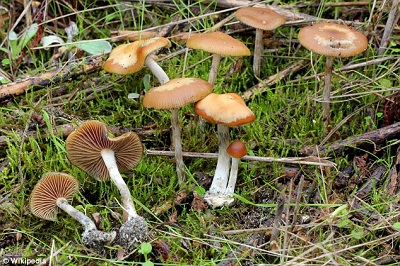Researchers say mind-altering compound may have evolved to trip up fungus-eating insects
They’ve gained notoriety for their hallucinogenic side-effects – but, so-called magic mushrooms may have developed their mind-altering properties as a way to protect themselves, according to Daily Mail.
Scientists have long remained perplexed by the ‘biological mystery’ of psychedelic mushrooms, which contain the compound psilocybin but appear to have little in common between the different species.
Now, new research on several types of mushrooms, both hallucinogenic and not, has revealed a cluster of genes that could explain the link.
According to the experts, the genes responsible for psilocybin may have emerged to trick fungus-eating insects into feeling less hungry, to prevent them from devouring the mushrooms.
In the new study, researchers compared three species of psychedelic mushrooms, each containing the hallucinogenic compound psilocybin, and three related mushrooms that do not produce the compound.
Given the variations in the biological lineage of magic mushrooms, experts suspect genetic material may have crossed between the species in a process known as horizontal gene transfer, in response to stress or environmental opportunities.
The study pinpointed a cluster of five genes that appear to link the different psychedelic mushrooms.
‘But our main question is, ‘How did it evolve?”’ said lead researcher Jason Slot. ‘What is the role of psilocybin in nature?’
Upon further investigation, the researchers found what they say could be an ‘evolutionary clue’ on the emergence of the mind-altering compound.
According to the study, the genes responsible for the production of psilocybin may have been exchanged in an environment dominated by fungus-eating insects – primarily, in animal manure.
While psilocybin is known to interfere with a neurotransmitter in humans, it also has an effect on insects.
In flies, the researchers say its suppression of a particular neurotransmitter results in decreased appetite.
‘We speculate that mushrooms evolved to be hallucinogenic because it lowered the chances of the fungi getting eaten by insects,’ Slot said.
‘The psilocybin probably doesn’t just poison predators or taste bad. These mushrooms are altering the insects’ mind – if they have minds – to meet their own needs.’
For non-hallucinogenic mushrooms that are also equipped with this type of genetic protection, the researchers say the environment may also be to blame.
These unrelated species also grow in animal feces and rotten wood.
In addition to unlocking some of the mysteries behind ‘magic mushrooms,’ the researchers say the new findings could pave the way for new treatments for neurological diseases.
The compound psilocybin has been investigated for potential use to help mental disorders including depression, addiction, and anxiety.
N.H.Kh

